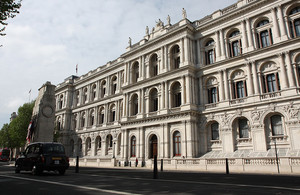Environment Secretary meets with water company chief executives
News story
The Environment Secretary met with water companies to discuss the measures they are taking to protect water supplies in the driest summer in over 50 years.

The Environment Secretary and Environment Minister Steve Double met with the chief executives of water companies this morning to discuss the ongoing response to the prolonged dry weather.
Ministers heard from chief executives about how their companies are taking necessary steps to safeguard public water supplies and mitigate the effects of this exceptionally dry period.
Environment Secretary George Eustice said:
Today I met the chief executives of water companies to discuss the measures they are taking to protect water supplies in what is the driest summer in over 50 years.
All water companies have reassured me that water supplies remain resilient across the country. Each company has a pre-agreed drought plan which they are following, and I have urged them to take any precautionary steps needed to protect essential supplies as we go into a likely very dry autumn.
We are better prepared than ever before for periods of dry weather with a system that is working well to manage water usage, protect the environment and maintain water supplies for the public and critical sectors. We will continue to actively monitor the situation, working alongside partners including the Environment Agency.
Whilst all water companies have reassured us that essential supplies are still safe, it is their duty to maintain those supplies.
The Environment Secretary has said that in accordance with their pre-agreed drought plans, water companies across the country have rightly taken action to mitigate the effects of this prolonged dry weather using the range of tools available to them.
Each company has a locally tailored drought plan and we urge them to act responsibly to implement that plan to safeguard public water supplies. Eight water companies have enacted their statutory drought plans with others stating they are following the steps set out in their plans.
While there is an important role for individuals to sustainably manage their usage, we expect water companies to act to reduce leakage and fix leaking pipes as quickly as possible, and take wider action alongside government policy.
Published 10 August 2022

